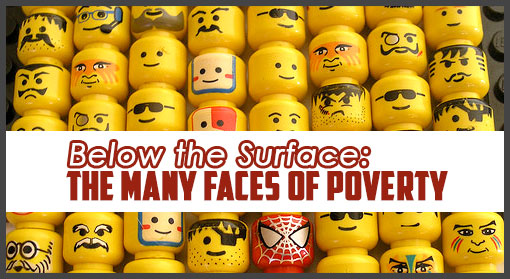Below the Surface: The Many Faces of Poverty
by Jeremy Kiner, Co-Director | JANUARY, 2015 It has taken us nearly 5 years to fully recognize the breadth of the needs of the Parma area community. Admittedly, when Community Ambassadors first began in 2010, we operated off some presumption that the needs and challenges facing the community were more obvious, and perhaps more simple, than what they truly were.
It has taken us nearly 5 years to fully recognize the breadth of the needs of the Parma area community. Admittedly, when Community Ambassadors first began in 2010, we operated off some presumption that the needs and challenges facing the community were more obvious, and perhaps more simple, than what they truly were.
On the surface, we knew that there were a high number of local residents who faced financial hardship and were in need of food assistance due to rising unemployment rates. We also knew that there were 50 plus kids in the Parma City School District that were classified as homeless. Our surface digging had revealed as much. Yet the deeper we dug, the more murky and complicated we found the problems to be. We eventually learned that the rate of fatherless homes in the Parma area was somewhere in the range of 1,700. Then, we learned that there was a rising orphan epidemic occurring right under our noses. More recently, we are learning of the alarming heroin and opiate epidemic plaguing our community.
What is poverty?

Jeremy Kiner
In the beginning of Community Ambassadors, a core component of our mission entailed helping to alleviate poverty in our community. While this still remains to be true, our idea of what poverty is has been redefined, as has our approach to alleviating it. In the classical sense, the word “poverty” simply means to lack material things – such as money, food, clothes, or shelter. But is this a fair definition of what poverty actually is? And are there other forms or degrees of poverty?
As we took our first stabs at addressing problems we had identified in the community, we soon discovered that the poverty we were trying to alleviate wasn’t always so one-dimensional. And the answers weren’t always so clear-cut, either. If they were, a hot meal or a free coat would resolve the issue. Instead, we learned that poverty goes beyond economic circumstances and is not limited to just material possessions. In fact, poverty wears many different faces.
For one person it may appear to be a need for food. For another, a need for clothing or shelter. On the surface, these needs can often be seen without much digging. The less obvious needs, however, are a poverty of another kind. They run deeper. They are more complicated. They are, in fact, poverties of hope, of love, of peace, of empowerment – things that can only be restored through the power and process of relationship.
Are we addressing the problem or only the symptom?
What I have found lacking in many poverty-alleviation efforts, including our own sometimes, is the desire to invite people into relationship. It’s far easier to address a symptom than it is to deal with the root. It’s much less complicated to hand someone a can of food or twenty dollars than it is to invite them into relationship.
We must not forget that people possess a physical, emotional, and spiritual dimension that ALL need addressed in our poverty-alleviation efforts (1 Thess. 5:23). Otherwise, when we try to alleviate one symptom, we inadvertently create or leave another area of poverty unaddressed in the person. In other words, if all we do is provide a free meal, yet never invite that person into personal relationship, we might meet their physical need, but we fall short of addressing their ultimate poverty.
In some cases, giving and helping can actually cause more harm than good. In fact, I have witnessed where my giving to others can invoke – albeit unintentionally – a feeling of shame or inferiority in the receiver, thus creating or perpetuating an emotional or psychological poverty that paralyzes the person from taking steps to improve their situation. This, of course, is not good. But this is what happens when we focus only on addressing symptoms and not the whole person.
Is identifying the problems and starting a ministry enough?
While one of the most critical tasks in any community outreach is researching and identifying the needs of the neighborhoods we reside in and influence, it is really only half the battle. Our knowledge of what is going on around us is of little value if it does not translate into meaningful service to others.
Therefore, our acknowledgment of the problem is only the first step. From there, our actions and strategies for responding to legitimate needs should be carefully considered. Simply identifying the need for a food outreach, for instance, and then launching a food ministry doesn’t necessarily mean we are addressing the problem. We must think beyond the tangible measures we take in helping others. How are we addressing the whole person?
Over the past few years, we have witnessed many patrons who visit our weekly food outreach, Pay It Forward Cafe, not due to their need for a free meal, but due to their need to belong to an authentic and nurturing community. This realization has shifted the way we serve through this program. More and more, we have learned to focus less on the delivery of food and more on the delivery of genuine fellowship with one another. Even in the busyness of preparing and serving – the things we must do – we still try our best to pause in our processes to ensure that we are not missing those critical moments to connect with others beyond the surface.
The Key is Relationship
Because human beings are multifaceted, our poverty-alleviation efforts should also be multifaceted. There are no silver bullets or one-size-fits-all solutions when dealing with poverty. Nevertheless, through the Holy Spirit, we can approach those in need as Jesus did with the woman at the well, searching beyond the symptoms to see the whole poverty, whichever face it bears, and offering something that outlasts a momentary fix.
People are longing to feel love, and hope, and peace – from other people – not a program, not an organization, not a church building. People. Certainly, it is only Jesus Christ who can heal and restore all that is broken in a person’s life, but we mustn’t forget that before people meet Christ, they meet us. They meet us at our food pantries, at our hospital visitations, at our school supply drives. So when we engage them, let’s go beyond just inviting them to our church. Let’s invite them into our heart.
2 Corinthians 5:20 states, “So we are Christ’s ambassadors; God is making his appeal through us…” God is using you, He is using me, to reflect the power and love of Christ to others through the most effective tool God has ever given the Church – relationship.



